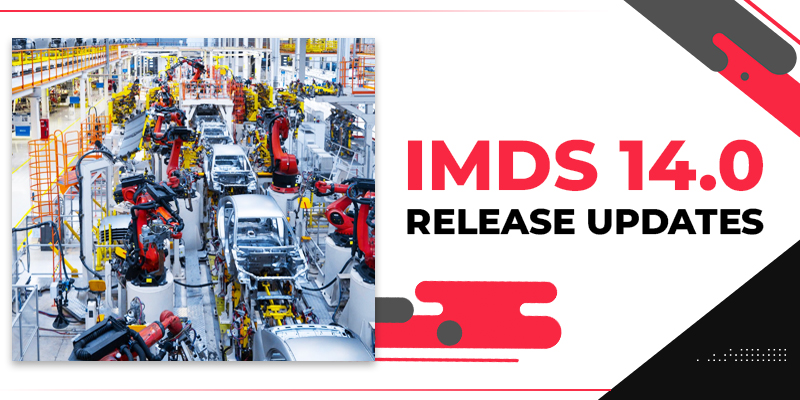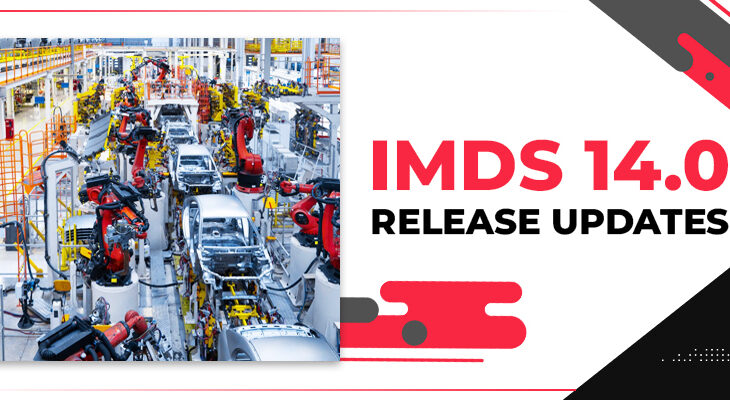
The newest version of the International Material Database system IMDS 14.0 was released on May 10,2023.
The following are the improvements included in the release.
Structure Mix:
Check messages of different nodes at the same level were added with the 13.2 release has been removed. Instead, there will be an option to define the purpose of any non-component reference on the same level as a component.
SC90 for filled/unfilled thermoplastics:
With this update, SC90 will now check to see if the filler content in the classifications 5.1.a (filled thermoplastics) and 5.1.b (unfilled thermoplastics) is 5% or less. To group every filler ingredient utilized in the material such that the count is at least 5%, a new grouping approach is developed.
Extended contact information:
The extended contact support by providing access to assign the contact person for newly created MDS requests. The company’s default contact information will be displayed if there is no designated contact person or if the designated contact person has been deactivated Additionally, this release includes a dialogue box with the option to hide the contact information upon MDS rejection. Confirm or update their company’s default contact In every 90 days..
Revealing confidential declarable substances:
Two weeks after each GADSL/SVHC update.
All the newly flagged substance marked as confidential its info will be revealed. This process will be automatic and will require no further action by the user.
Check for old MDSs :
Own datasheet referencing non standard publisher MDSs older than 10 years.
- Shown an error in the check. Instead new version has to be created.
Chemical recycling and bio-based materials:
The bio-based materials are added through IMDS with the option to declare the certification to a certain standards and mass-balanced bio-based and chemical recycled materials..
PFAS- THE NEXT GROUP OF SUBSTANCE TO BE OUTLAWED
PFAS substances abbreviation for per- and polyfluorinated alkyl substances are currently a topic of debate. What precisely are PFAS substances and why are they considered problematic? These are industrially produced organic compounds made of carbon, hydrogen and Fluorine and are extremely harmful to human health. These substances do not degrade and accumulate in the Environment, hence known as “forever chemicals” or “the poisons of the century.” Perfluorinated and polyfluorinated alkyl substances (PFAS), a class of frequently used man-made compounds, consist of more than 10000 different chemicals.
Automotive Industry Screening for PFAS
PFAS restrictions would have a significant influence on the automobile sector. In many nations, including the USA and many EU countries, proposals are being made to impose limits. Because not all compounds behave the same way and not all substances are released into the environment, many industrial enterprises are opposing this. A recent document published by the IMDS steering committee states the importance of tracking these substances and to develop effective methods to solve PFAS issues. Its highly important to identify all PFAS-containing components and materials, consider alternatives, and create efficient treatment and disposal solutions.
Updates have been made to GADSL. As a result, Manufacturers are now able to record all PFASs utilized in your products and consider the extremely low GADSL reporting requirements.
Sunstream Global Technologies is a leading provider of material compliance services for automotive and other industry. Our IMDS Services has assisted several automotive manufacturers to reduce cost and reach into compliance faster. Reach out to us today to know more about EU REACH compliance, RoHS Compliance, conflict mineral compliance and IMDS compliance.




 +1.585.935.7123
+1.585.935.7123 +91-804-148-6861
+91-804-148-6861